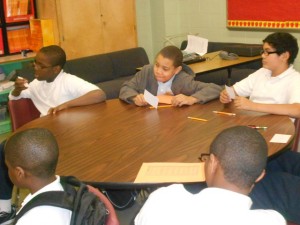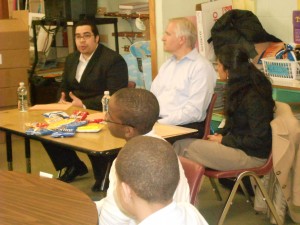Are You More Financially Literate than a 6th Grader?
Christopher Flor is a Second Year Teaching Fellow at the Louise A. Spencer School in Newark, NJ. Too often, students are unprepared for the economic practicalities they'll face as adults. Heck, too often, adults are unprepared for the financial and economic realities they're currently facing. It is all too apparent that we need to increase financial literacy instruction (FLI) in our schools and, encouragingly, that movement is gaining ground around the country.
Over the past decade, the Federal Government has placed FLI on its agenda for education reform. As of 2009, 44 states had put in place curriculum guidelines for improving financial literacy across grades K-12. Of these states, 24 of them require that all students receive instruction in personal finance. After all, it cannot be overstated that having a basic understanding of personal finance is compulsory for success and stability in the 21st Century.
Citizen Schools has placed itself in the thick of this movement to improve financial literacy among scholars. Strong partnerships with corporations like Fidelity Investments and Bank of America are helping to bring personal finance education to our scholars.
Just this past February, Citizen Schools' programs at Louise A. Spencer and Martin Luther King, Jr. Elementary Schools in Newark, NJ, launched the first Stock Market Game in the national network. The teams at both of these schools have joined schools around the country in participating in a national competition hosted by the Securities Industries and Financial Markets Association (SIFMA).
The gains in students’ knowledge of financial literacy have been remarkable. Already, our students can independently research stock quotes and use 21st Century research skills to deduce why a stock performs a certain way and to make informed decisions about predicting how a stock will perform in the future.
Through this process, students have also learned the basics of how companies and corporations grow, how they raise capital by public trading on the market, and how diversification can protect a portfolio from the damages of risky investments. But most importantly, students have learned a key skill that has for a long time separated working class citizens from their more wealthy counterparts in society: the understanding that working for money is not the only key to financial success and stability—rather, it is the ability to make your money work for you that generates the most wealth among economically successful citizens.
Nowhere was this incredible learning more evident than at Louise A. Spencer’s Financial Advisors Panel hosted by Fidelity Investments on Tuesday, April 24. Our students sat attentively before Fidelity Vice President, Scott Bohlen and Fidelity advisors Grevin Rodriguez and Sujatha Sivakumaran as they discussed the realities of working in a competitive job market and gave insights about how to navigate the unpredictable nature of the market. The interest of our apprentices was evidenced best in their thought provoking questions. Carlos asked, “What are the three best habits I can keep in school to become successful when I grow up?” Other students asked about how to keep a job and do well in it. Tyrek inquired about what short selling stock means, while Ebony asked about good college programs for business.
Citizen Schools' programs at Louise A Spencer and Martin Luther King, Jr. schools will wrap up their national competition with SIFMA on May 25. Be sure to stay tuned to find out how our teams fared against other schools around the country!

